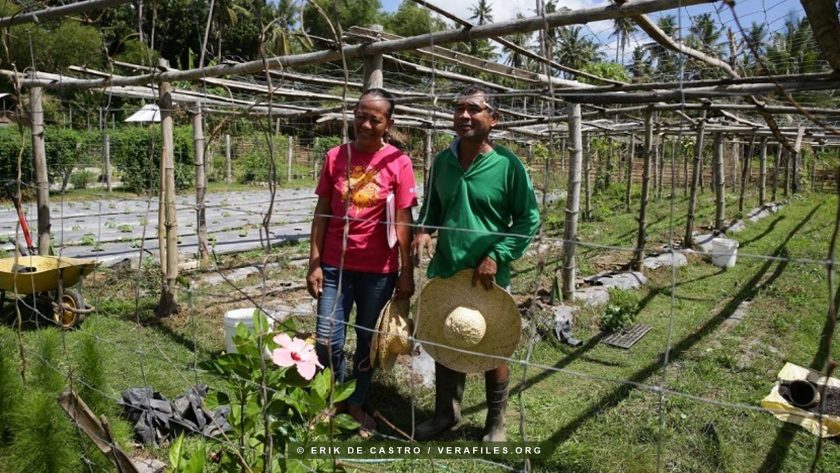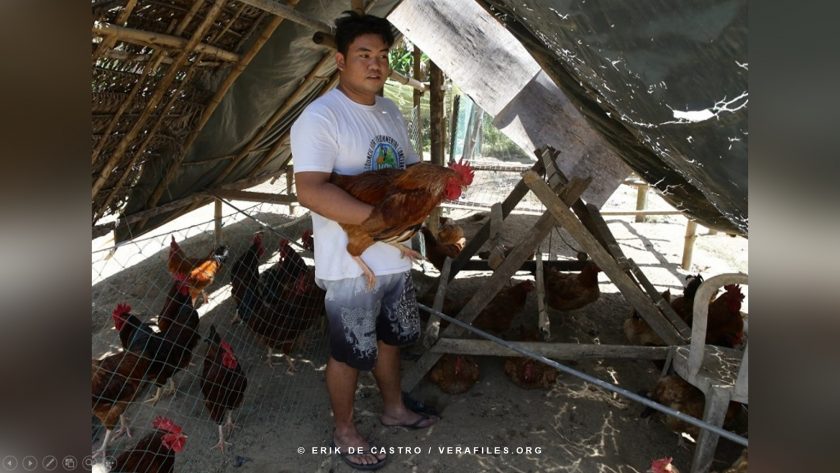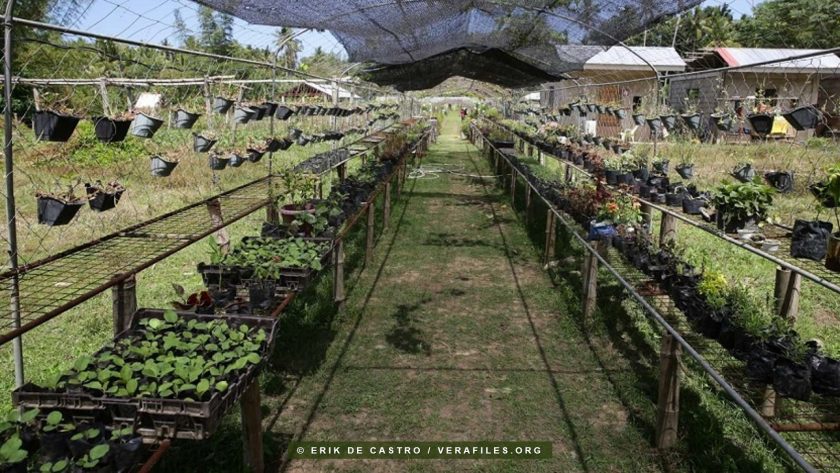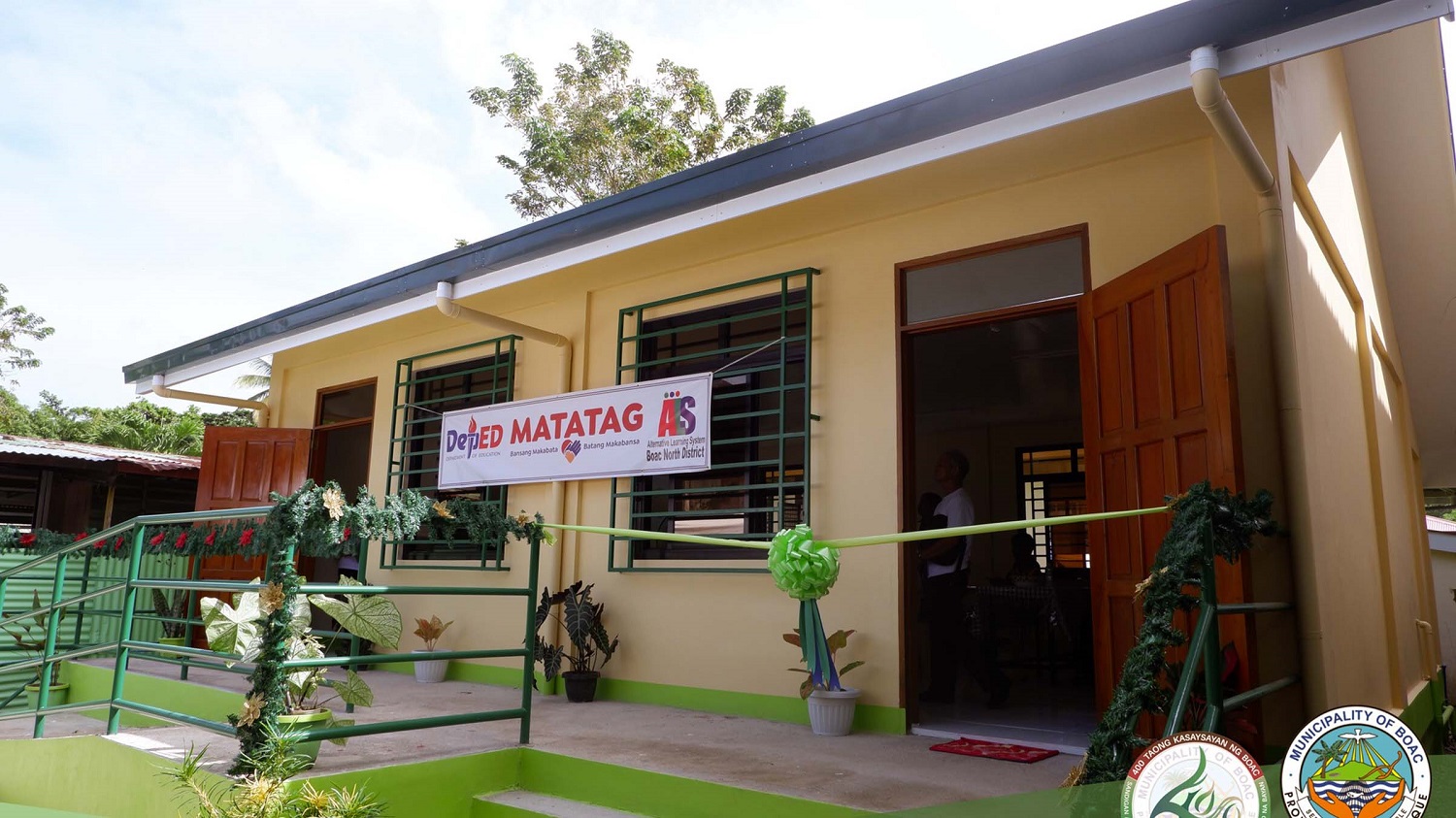BOAC, MARINDUQUE— In a land known to many as poisoned by a toxic mine spillage, there’s a field of green that thrives, harvesting nature’s unadulterated bounty.
So even as the noonday sun was scorching, 57-year-old Domingo de la Cruz doesn’t take a break from his work in his organic farm, an oasis a few hundred meters from the dead and heavily silted Boac River.
“It’s time for lunch!” his wife, Violeta, called out to him and their student-farm assistant, Mark Jade Landig. Smiling, she shrugged in mock frustration, saying they often get wrapped up in farm work they forget to eat.
The de la Cruz couple began DMDC Farm in 2017, raising vegetables, poultry, fish, and livestock in an 8,551 square meter land in Barangay Poras in Boac town.

They grow crops like eggplants, okra, tomatoes, cayenne pepper, mustard leaves, and cabbage. Their carabao was busy eating as chickens and the couple’s frisky puppy ran around the farm. The crops and livestock are all healthy and chemical-free.
The de la Cruzes are both from Mogpog town where several residents have tested positive for lead and other chemical content in their bodies. The chemicals are believed to be from Marcopper’s contamination of Mogpog River since it began its mining operations in the late 1960s.
Mogpog residents have swum and fished in the river all their lives until a huge flood in 1993, when a Marcopper dam burst, unleashing mine waste that drowned two children and filled the river with toxic silt.
Three years later, mine waste spilled into the Boac River after Marcopper’s Tapian dam gave way in what is probably the worst mining disaster in the country.
The two incidents killed the Mogpog and Boac Rivers. Small streams of water run through them, still contaminated with toxic chemicals that those who cross them often end up with skin diseases.
The de la Cruzes are advocates of organic farming because they believe in being kind to the body and the environment.

They impart that belief to students like Mark who train under DMDC Farm’s organic agriculture production program. DMDC is one of the organic farm schools in Marinduque accredited by the Department of Agriculture and the Technical Education and Skills Development Authority.
The de la Cruzes’ apprentices are in their 20s. After their six-month training in DMDC Farms, they fly to Japan to be trained in organic farming by the couple’s Japanese friend.
It’s the same path that Domingo, who has always dreamed of becoming a farmer, took more than 30 years ago. In 1989, he was among young Filipino farmers chosen by the DA to train in Japan for almost a year.
On his return to Marinduque, he continued to work in his family’s farm in Mogpog, but later tried his hands in an office job.
After five years, Domingo knew that his calling was to till the soil and harvest the bounty it brings. He quit his job and started his own farm with Violeta. His farm training never stopped. He would go to Japan and Thailand to learn the latest farming innovations and would teach them to young Filipinos.
Violeta, 49, also developed a love for farming. She resigned last year after 15 years as a teacher to work full time in their farm.
If they are not interested, Domingo told his children, he would raffle off the farm to a foundation or organization that will sustain it.
He believes families must invest in agri-entrepreneurship. “Nasa lupa ang pera. One or two in the family must pursue agri-entrepreneurship. Dapat i-career. Make it your passion. Your family, your neighbors will have nothing to eat if there are no farms being cultivated,” he said.
Violeta says Marinduque hasn’t really been known to be a crop-producing province and would get its vegetables from Sariaya, Quezon.

That is why the de la Cruzes are happy with the gradual shift towards organic farming in Marinduque. Even their next-door-neighbors in Poras are now into organic farming.
Organic farming is universally more expensive and labor-driven, and as such, the produce are also quite pricey, Violeta said.
“But here in Marinduque, we cannot really sell our products at a high price because we are encouraging people to shift to organic,” she said. “There’s really very little profit from our farm but that’s not our goal. What we want is for our kababayans to have access to healthy food.”
The provincial hospital is one of their regular clients. Violeta said the hospital orders different kinds of vegetables from their farm for their patients’ meals.
[fb_plugin video href=”https://www.facebook.com/marinduquenews/videos/436507033544610/” ]
Last year, the Department of Tourism (DOT) accredited DMDC and two other farms in Marinduque as agri-tourism sites, also known as “fun farms,” which are becoming popular tourist destinations.
The de la Cruzes are now busy preparing for summer, when tourists descend on Marinduque for the Moriones Lenten Rites, outdoor activities, sight-seeing and authentic farm experience.
The couple is in the middle of building rooms and huts, and planning activities for the guests.
“Usually, tourists like to do some fishing and they want to help in planting or harvesting the crops. Then they’d buy organic vegetables to bring home,” Violeta says.
And that spreads the gospel of organic farming.
This story written by Nikko Dizon was first published, and is produced by VERA Files under a project supported by the Internews’ Earth Journalism Network, which aims to empower journalists from developing countries to cover the environment more effectively.

